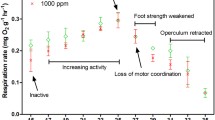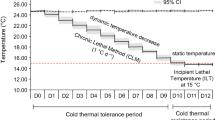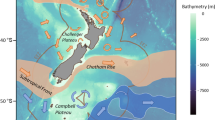Abstract
Tropical species are predicted to be particularly vulnerable to the impacts of climate change given the relatively narrow thermal range they naturally experience. Within the tropics, average temperature and thermal variation can differ among populations and consequently low-latitude populations may respond differently to increased temperatures than higher latitude tropical populations. In this study, we investigate the long-term effects of climate change relevant temperature increases on commonly measured condition metrics for a low-latitude population of damselfish (Acanthochromis polyacanthus). Adult fish were randomly assigned to one of the three seasonally cycling treatments: (1) current average ocean temperatures for the collection locations, (2) 1.5 °C, or (3) 3 °C higher than current average temperatures. Treatments were maintained for approximately 10 months. At the end of the experimental period, Fulton’s K and hepatosomatic index were calculated for fish from each treatment group and critical thermal limit (CTMax) was measured for a subset of fish at control temperatures. Fish mortality was recorded throughout the experimental period, as well as at the end of the experimental period after the introduction of a secondary exercise stressor. No significant effect of temperature was observed on fish condition (Fulton’s K and hepatosomatic index); however, significant mortality was observed for fish maintained at 3 °C higher than current average temperatures. When a secondary exercise stressor was introduced, significant mortality was also observed at 1.5 °C higher than current average temperatures. Acute exposure to higher temperatures (CTMax) suggested a much higher thermal tolerance for this population than long-term mortality, producing a thermal limit of 37.1 °C compared with a chronic thermal limit of 33 °C. Our results show that some basic measures of fish condition may not be capable of detecting lethal and sub-lethal effects of increased temperature. The results of this study are consistent with the hypothesis that low-latitude species are already living close to their thermal maximum.




Similar content being viewed by others
Abbreviations
- AIMS:
-
Australian Institute of Marine Science
- CO2 :
-
Carbon dioxide
- CTMax :
-
Critical thermal maxima
- GBR:
-
Great Barrier Reef
- PNG:
-
Papua New Guinea
- SST:
-
Sea surface temperature
References
Adams SM, Shepard KL, Greeley MS, Jimenez BD, Ryon MG, Shugart LR, McCarthy JF, Hinton DE (1989) The use of bioindicators for assessing the effects of pollutant stress on fish. Mar Environ Res 28:459–464
Addo-Bediako A, Chown SL, Gaston KJ (2000) Thermal tolerance, climatic variability and latitude. P R Soc Lond B Biol 267:739–745
Angilletta M (2009) Thermal adaptation: a theoretical and empirical synthesis. Oxford University Press, Oxford
Becker CD, Genoway RG (1979) Evaluation of the critical thermal maximum for determining thermal tolerance of freshwater fish. Environ Biol Fish 4:245–256
Bowden AJ, Gardiner NM, Couturier CS, Stecyk JAW, Nilsson GE, Munday PL, Rummer JL (2014) Alterations in gill structure in tropical reef fishes as a result of elevated temperatures. Comp Biochem Phys A 175:64–71
Bruslé J, Anadon GG (1996) The structure and function of fish liver. In: Munshi JSD, Dutta HM (eds) Fish morphology. Science Publishers, North-Holland, pp 77–93
Burrows MT, Schoeman DS, Buckley LB, Moore P, Poloczanska ES, Brander KM, Brown C, Bruno JF, Duarte CM, Halpern BS, Holding J, Kappel CV, Kiessling W, O’Connor MI, Pandolfi JM, Parmesan C, Schwing FB, Sydeman WJ, Richardson AJ (2011) The pace of shifting climate in marine and terrestrial ecosystems. Science 334:652–655
Clark TD, Roche DG, Binning SA, Speers-Roesch B, Sundin J (2017) Maximum thermal limits of coral reef damselfishes are size dependent and resilient to near-future ocean acidification. J Exp Biol 220:3519–3526
Cossins A (2012) Temperature biology of animals. Springer Science & Business Media
Cox DK (1974) Effects of three heating rates on the critical thermal maximum of bluegill. In: Gibbons JW, Sharitz RR (eds) Thermal ecology. National Technical Information Service, Springfield, pp 158–163
Deutsch CA, Tewksbury JJ, Huey RB, Sheldon KS, Ghalambor CK, Haak DC, Martin PR (2008) Impacts of climate warming on terrestrial ectotherms across latitude. PNAS 105:6668–6672
Doherty PJ, Mather P, Planes S (1994) Acanthochromis polyacanthus, a fish lacking larval dispersal, has genetically differentiated populations at local and regional scales on the Great Barrier Reef. Mar Biol 121:11–21
Donelson JM, Munday PL (2012) Thermal sensitivity does not determine acclimation capacity for a tropical reef fish. J Anim Ecol 81:1126–1131
Donelson JM, Munday PL, McCormick MI, Pankhurst NW, Pankhurst PM (2010) Effects of elevated water temperature and food availability on the reproductive performance of a coral reef fish. Mar Ecol Prog Ser 401:233–243
Donelson JM, Munday PL, McCormick MI, Nilsson GE (2011) Acclimation to predicted ocean warming through developmental plasticity in a tropical reef fish. Glob Chang Biol 17:1712–1719
Donelson JM, Munday PL, McCormick MI, Pitcher CR (2012) Rapid transgenerational acclimation of a tropical reef fish to climate change. Nat Clim Chang 2:30–32
Donelson JM, Wong MYL, Booth D, Munday PL (2016) Transgenerational plasticity of reproduction depends on rate of warming across generations. Evol Appl 9:1072–1081
Franklin CE, Davison W, Seebacher F (2007) Antarctic fish can compensate for rising temperatures: thermal acclimation of cardiac performance in Pagothenia borchgrevinki. J Exp Biol 210:3068–3074
Froese R (2006) Cube law, condition factor and weight–length relationships: history, meta-analysis and recommendations. J Appl Ichthyol 22:241–253
Fry FEJ, Hart JS (1948) Cruising speed of goldfish in relation to water temperature. J Fish Res Board Can 7:169–175
Gardiner NM, Munday PL, Nilsson GE (2010) Counter-gradient variation in respiratory performance of coral reef fishes at elevated temperatures. PLoS One 5:e13299
Harley CDG, Hughes AR, Hultgren KM, Miner BG, Sorte CJB, Thornber CS, Rodriguez LF, Tomanek L, Williams SL (2006) The impacts of climate change in coastal marine systems. Ecol Lett 9:228–241
Hays GC, Richardson AJ, Robinson C (2005) Climate change and marine plankton. Trends Ecol Evol 20:337–344
Hicken CE, Linbo TL, Baldwin DH, Willis ML, Myers MS, Holland L, Larsen M, Stekoll MS, Rice SD, Collier TK, Scholz NL (2011) Sublethal exposure to crude oil during embryonic development alters cardiac morphology and reduces aerobic capacity in adult fish. Proc Natl Acad Sci USA 108:7086–7090
Htun-Han M (1978) The reproductive biology of the dab Limanda limanda (L.) in the North Sea: gonosomatic index, hepatosomatic index and condition factor. J Fish Biol 13:369–378
Huey RB, Hertz PE (1984) Is a jack-of-all-temperatures a master of none? Evolution 38:441–444
Janzen DH (1967) Why mountain passes are higher in the tropics. Am Nat 101:233–249
Johansen JL, Jones GP (2011) Increasing ocean temperature reduces the metabolic performance and swimming ability of coral reef damselfishes. Glob Chang Biol 17:2971–2979
Johnson TP, Bennett AF (1995) The thermal acclimation of burst escape performance in fish: an integrated study of molecular and cellular physiology and organismal performance. J Exp Biol 198:2165–2175
Kavanagh KD (2000) Larval brooding in the marine damselfish Acanthochromis polyacanthus (Pomacentridae) is correlated with highly divergent morphology, ontogeny and life-history traits. Bull Mar Sci 66:321–337
Kawecki TJ, Ebert D (2004) Conceptual issues in local adaptation. Ecol Lett 7:1225–1241
Kellermann V, Overgaard J, Hoffmann AA, Fløjgaard C, Svenning JC, Loeschcke V (2012) Upper thermal limits of Drosophila are linked to species distributions and strongly constrained phylogenetically. PNAS 109:16228–16233
Lenhardt M, Jaric I, Cakic P, Cvijanovic G, Gacic Z, Kolarevic J (2009) Seasonal changes in condition, hepatosomatic index and parasitism in sterlet (Acipenser ruthenus L.). Turk J Vet Anim Sci 33:209–214
Marcogliese DJ, Brambilla LG, Gagné F, Gendron AD (2005) Joint effects of parasitism and pollution on oxidative stress biomarkers in yellow perch Perca flavescens. Dis Aquat Org 63:77–84
Mora C, Ospina AF (2001) Tolerance to high temperatures and potential impact of sea warming on reef fishes of Gorgona Island (tropical eastern Pacific). Mar Biol 139:765–769
Munday PL, Jones GP, Pratchett MS, Williams AJ (2008a) Climate change and the future for our coral reefs. Fish Fish 9:261–285
Munday PL, Kingsford MJ, O’Callaghan M, Donelson JM (2008b) Elevated temperature restricts growth potential of the coral reef fish Acanthochromis polyacanthus. Coral Reefs 27:927–931
Munday PL, Crawley NE, Nilsson GE (2009) Interacting effects of elevated temperature and ocean acidification on the aerobic performance of coral reef fishes. Mar Ecol Prog Ser 388:235–242
Munday PL, McCormick MI, Nilsson GE (2012) Impact of global warming and rising CO2 levels on coral reef fishes: what hope for the future? J Exp Biol 215:3865–3873
Munday PL, Warner RR, Monro K, Pandolfi JM, Marshall DJ (2013) Predicting evolutionary responses to climate change in the sea. Ecol Lett 16:1488–1500
Nguyen KDT, Morley SA, Lai C-H, Clark MS, Tan KS, Bates AE, Peck LS (2011) Upper temperature limits of tropical marine ectotherms: global warming implications. PLoS One 6:e29340
Nilsson GE, Crawley N, Lunde IG, Munday PL (2009) Elevated temperature reduces the respiratory scope of coral reef fishes. Glob Chang Biol 15:1405–1412
Nilsson GE, Östlund-Nilsson S, Munday PL (2010) Effects of elevated temperature on coral reef fishes: loss of hypoxia tolerance and inability to acclimate. Comp Biochem Physiol A 156:389–393
Palacios MM, Killen SS, Nadler LE, White JR, McCormick MI (2016) Top-predators negate the effect of mesopredators on prey physiology. J Anim Ecol 85:1078–1086
Pankhurst NW, Munday PL (2011) Effects of climate change on fish reproduction and early life history stages. Mar Freshw Res 62:1015–1026
Planes S, Doherty PJ, Bernardi G (2001) Strong genetic divergence among populations of a marine fish with limited dispersal, Acanthochromis polyacanthus, within the Great Barrier Reef and the Coral Sea. Evolution 55:2263–2273
Podrabsky JE, Somero GN (2006) Inducible heat tolerance in Antarctic notothenioid fishes. Polar Biol 30:39–43
Pörtner HO (2010) Oxygen-and capacity-limitation of thermal tolerance: a matrix for integrating climate-related stressor effects in marine ecosystems. J Exp Biol 213:881–893
Pratchett MS, Wilson SK, Munday PL (2015) Effects of climate change on coral reef fishes. In: Mora C (ed) Ecology of fishes on coral reefs. Cambridge University Press, Cambridge, pp 127–134
Randall JE, Allen RA, Steene RC (1997) Fishes of the Great Barrier Reef and Coral Sea. Crawford House Press, Bathurst
Rätz HJ, Lloret J (2003) Variation in fish condition between Atlantic cod (Gadus morhua) stocks, the effect on their productivity and management implications. Fish Res 60:369–380
Robertson DR (1973) Field observations on the reproductive behaviour of a pomacentrid fish, Acanthochromis polyacanthus. Z Tierpsychol 32:319–324
Rummer JL, Couturier CS, Stecyk JAW, Gardiner NM, Kinch JP, Nilsson GE, Munday PL (2014) Life on the edge: thermal optima for aerobic scope of equatorial reef fishes are close to current day temperatures. Glob Chang Biol 20:1055–1066
Salinas S, Munch SB (2012) Thermal legacies: transgenerational effects of temperature on growth in a vertebrate. Ecol Lett 15:159–163
Sandhu N, McGeer JC, Vijayan MM (2014) Exposure to environmental levels of waterborne cadmium impacts corticosteroidogenic and metabolic capacities, and compromises secondary stressor performance in rainbow trout. Aquat Toxicol 146:20–27
Seebacher F, Davison W, Lowe CJ, Franklin CE (2005) A falsification of the thermal specialization paradigm: compensation for elevated temperatures in Antarctic fishes. Biol Lett 1:151–154
Seebacher F, White CR, Franklin CE (2015) Physiological plasticity increases resilience of ectothermic animals to climate change. Nat Clim Chang 5:61–66
Stillman JH (2003) Acclimation capacity underlies susceptibility to climate change. Science 301:65
Stocker TF, Qin D, Plattner G-K, Tignor M, Allen SK, Boschung J, Nauels A, Xia Y, Bex V, Midgley PM (2013) Climate change 2013: the physical science basis. Contribution of working group I to the fifth assessment report of the intergovernmental panel on climate change. Cambridge University Press, Cambridge, p 1132
Sunday JM, Bates AE, Dulvy NK (2011) Global analysis of thermal tolerance and latitude in ectotherms. P R Soc Lond B Biol 278:1823–1830
Sunday JM, Bates AE, Dulvy NK (2012) Thermal tolerance and the global redistribution of animals. Nat Clim Chang 2:686–690
Sunday JM, Calosi P, Dupont S, Munday PL, Stillman JH, Reusch TB (2014) Evolution in an acidifying ocean. Trends Ecol Evol 29:117–125
Svåsand T, Jørstad KE, Otterå H, Kjesbu OS (1996) Differences in growth performance between Arcto-Norwegian and Norwegian coastal cod reared under identical conditions. J Fish Biol 49:108–119
Tewksbury JJ, Huey RB, Deutsch CA (2008) Putting the heat on tropical animals. Science 320:1296–1297
Thresher RE (1983) Habitat effects on reproductive success in the coral reef fish, Acanthochromis polyacanthus (Pomacentridae). Ecology 64:1184–1199
Varsamos S, Wendelaar Bonga SE, Charmantier G, Flik G (2004) Drinking and Na+/K+ ATPase activity during early development of European sea bass, Dicentrarchus labrax—ontogeny and short-term regulation following acute salinity changes. J Exp Mar Biol Ecol 311:189–200
Wilson RS, Hammill E, Johnston IA (2007) Competition moderates the benefits of thermal acclimation to reproductive performance in male eastern mosquitofish. P R Soc Lond B Biol 274:1199–1204
Zarco-Perelló S, Pratchett M, Liao V (2012) Temperature-growth performance curves for a coral reef fish, Acanthochromis polyacanthus. Galaxea 14:97–103
Acknowledgements
Thank you to staff at JCU Research Aquarium Facility for logistical support. Thank you also to Sue-Ann Watson, Mike Emslie and Dave Williamson as well as the skipper and crew of the Kalinda for their aid in fish collection, and to Olivia Eisenbach for assistance in the lab. Appreciation is extended to Rhondda Jones for assistance with statistical analyses. Research funding was provided by an Australian Research Council Grant. Support was also provided by the ARC Centre of Excellence for Coral Reef Studies and the James Cook University Higher Degree Research Enhancement Funding Scheme. Appreciation is extended to three anonymous reviewers for their comprehensive feedback and valued suggestions throughout the review process.
Author information
Authors and Affiliations
Corresponding author
Ethics declarations
Conflict of interest
The authors declare that they have no conflict of interest.
Ethical approval
All applicable institutional and/or national guidelines for the care and use of animals were followed. This project was completed under JCU Ethics A1737.
Availability of data and supporting materials
All data are available in the Tropical Data Hub (TDH) Research Data repository.
Additional information
Responsible Editor: A. E. Todgham.
Reviewed by Undisclosed experts.
Rights and permissions
About this article
Cite this article
Rodgers, G.G., Donelson, J.M., McCormick, M.I. et al. In hot water: sustained ocean warming reduces survival of a low-latitude coral reef fish. Mar Biol 165, 73 (2018). https://doi.org/10.1007/s00227-018-3333-z
Received:
Accepted:
Published:
DOI: https://doi.org/10.1007/s00227-018-3333-z




